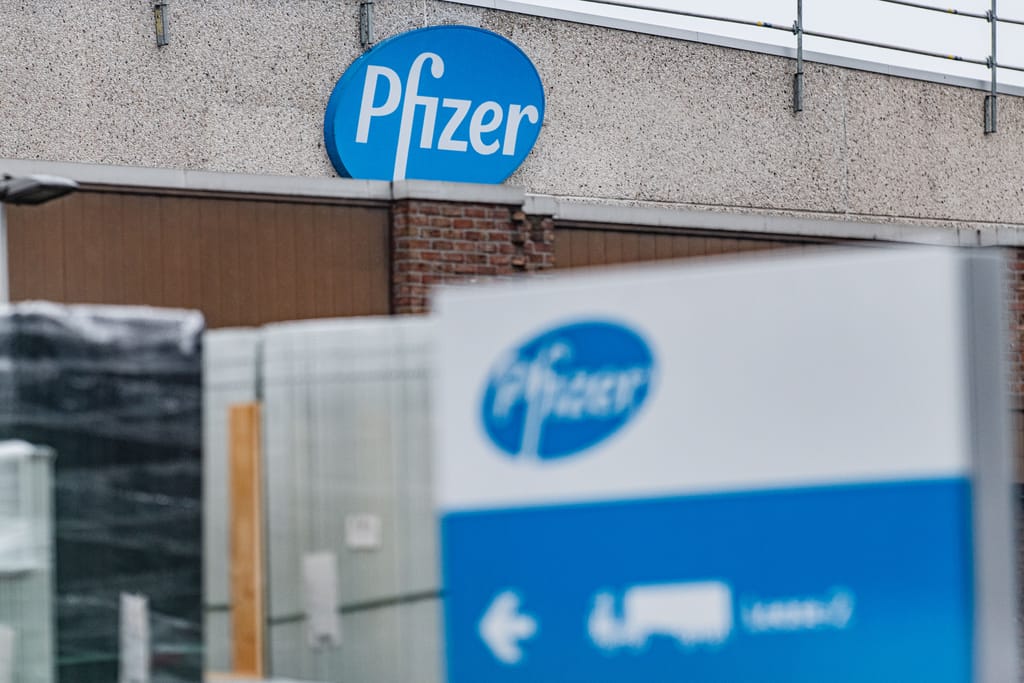It’s the scandal that won’t go away — and produces more intrigue than answers.
The EU’s public prosecutor’s office on Friday said it was investigating the EU’s purchase of coronavirus vaccines during the pandemic’s peak. Yet the cagey announcement offered almost no details — nothing on who it was investigating, what potential crimes it was looking for, or why it had taken the step now.
Enter the Brussels speculation machine. Its top chatter: Ursula von der Leyen’s texts.
For months, pressure has been piling up on the European Commission president since her admission that she swapped texts with Pfizer chief executive Albert Bourla while the EU was negotiating its vaccine contract with the company. Two EU watchdog agencies have already chided her over the matter, venting over the Commission’s refusal to produce the texts.
But is the European Public Prosecutor’s Office even looking into this matter? For now, there’s no way of knowing.
In the meantime, POLITICO breaks down what this might mean for von der Leyen and the EU, and looks at what (or who) else might be in the EU prosecutor’s crosshairs.
How did this all start?
In April 2021, von der Leyen told the New York Times that she had traded texts with the Pfizer CEO for a month in the run-up to the EU signing its contract with the U.S. pharmaceutical giant.
In the deal, the Commission committed to buy 900 million Pfizer-BioNTech shots on behalf of EU members, with an option to purchase another 900 million.
Why did this bother people?
The remarks prompted chatter about whether von der Leyen had freelanced during the contract negotiations and circumvented normal channels.
Journalists requested access to the texts, only to be told there was no record of such messages.
But the EU Ombudsman later revealed that the Commission had never explicitly asked von der Leyen’s team to look for the texts, since it didn’t consider them “documents” that merited preservation. In a report on its findings, the ombudsman branded the approach “maladministration.”
The Commission countered that it can’t provide the texts because “short-lived, ephemeral documents are not kept.”
A Pfizer official told the European Parliament that the company did not negotiate its vaccine contract via text message, but it’s not clear what politically sensitive decisions were made in crucial preliminary negotiations over text of which there is no public record | Jonas Roosens/BELGA/ AFP via Getty Images
Another EU watchdog, the European Court of Auditors, later piled on in its own probe. The agency found von der Leyen had intervened in early talks with Pfizer and sidelined the usual negotiating teams to personally hash out a preliminary deal.
“We asked the Commission to provide us with information on the preliminary negotiations for this agreement,” the court of auditors wrote in a report. “However, none was forthcoming.”
A Pfizer official last week told the European Parliament that the company did not negotiate its vaccine contract via text message. But while the legalese of the contract itself might have been decided by teams of lawyers, it’s not clear what politically sensitive decisions were taken in those crucial preliminary negotiations, of which there is no public record.
So what can we tell about whether the EU prosecutor is looking into this?
Not much, unfortunately.
The timing is interesting, but the EU prosecutor could very well be investigating any of the numerous vaccine contracts the EU signed, as well as other officials inside or outside the Commission.
One factor to consider: the EU prosecutor’s remit is to probe the misuse of EU funds. And most of the vaccines were ultimately paid for by EU members — not the EU itself. However, €2.5 billion in EU money was used to finance some of the upfront costs of vaccine production.
How bad could it get for von der Leyen?
Given that the EU prosecutor specifically investigates criminal matters, it can’t be overstated how bad this would be for von der Leyen if she was swept up in the probe. But again, there is no proof so far.
On Monday, a Commission spokesman said it “hadn’t received any information on this topic yet.”
Nonetheless, the issue is potentially toxic for von der Leyen given her involvement in a similar scandal while she was Germany’s defense minister.
During an investigation into Germany’s awarding of lucrative defense contracts during her time as minister, it emerged that data had been wiped from von der Leyen’s phones, precluding it from being used in the probe.
The EU prosecutor specifically investigates criminal matters. If von der Leyen was swept up in the probe it would not be good for her | Johanna Geron/ POOL/ AFP/ via Getty Images
Though investigators cleared von der Leyen in the matter, she told a German parliamentary inquiry that “lessons had been learned.”
Von der Leyen is also no stranger to the world of pharmaceuticals. Her husband, Heiko, is a director at the U.S. biotechnology company Orgenesis, and she’s a doctor by training.
Who else could it be?
Albanian Prime Minister Edi Rama made waves earlier this month when he admitted that Italy’s Foreign Minister Luigi Di Maio broke vaccine contract rules to give Albania shots on humanitarian grounds early in the pandemic.
But this would seemingly be outside of the EU prosecutor’s remit since the vaccines were purchased with Italian funds, and that donation doesn’t seem to meet the bar of “extremely high public interest” mentioned by the EPPO.
What’s next?
Probably a lot of silence from the EU prosecutor and a lot of rumors in Brussels — until investigators offer more clarity (or journalists figure out more).





